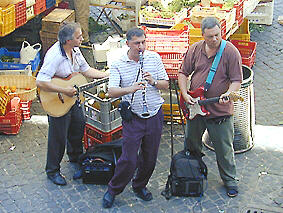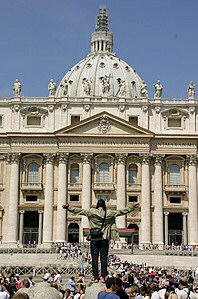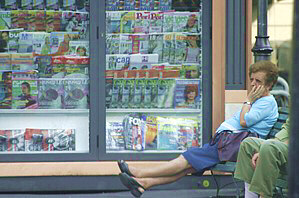The Romans: life scenes in Rome |
|
Nuns, priests, and monks
|
A flock of nuns chatting, reflecting and hobnobbing with tourists at Michelangelo's Campidoglio (Capitol Hill) |
All aspects of Italian life and culture have a human and humorous touch, especially in Rome. Even nuns and priests in Rome are joyful and serene.

Nuns having a break
Right: no one is immune from the national passion of the "telefonino" - cell phone - a priest chats in the street |
|
|
|
Devout Franciscan friars attending the Pope sermon at noon on Sunday (the "Angelus") |
Same group, a few minutes later, having a snack |
LEISURE TIME - WEALTHY PEOPLE
Romans are also masters of enjoying leisure time. Wealthy Romans always find new ways to relax and to have a great life. Rowing is traditionally an elitarian sport, as one needs to be introduced in the rowing clubs of the Tiber. A new elitarian fashion is to attend beaches and pools on the Tiber shores, right in the city centre.
|
|
Rowing and basking in the sun along the Tiber shores |
Pools by the Tiber, near the Vatican |
Back to the top
POOR PEOPLE, BEGGARS, STREET MUSICIANS, IMMIGRANTS AND BUMS
By contrast, in Rome you find naturally also poor people and beggars, although the latter are usually not Italian.
|
|
A beggar near a church, hoping for a caring hand. |
A gipsy beggar, an old lady, near the Coliseum. Her povery is enlarged by the contrast with the size of the monument |
Most poor people in Rome nowadays are immigrants. Nearly 3 millions settled in Italy in the past 25 years. They are usually hard workers, who can find mostly humble and unrewarding jobs. They form communities and they developed ingeniously some sort of own local services.
|
|
Homeless people sleeping under a bridge of the Tiber. They are usually not Italian. A popular Roman saying about falling into poverty is "to sleep under the bridges of the blond river" (IE the Tiber, whose waters have a light tonality).
|
Eastern European immigrants having a hair cut in a park, just in front of the Coliseum. Immigrants can find only humble works, and the large majority of them are decent, harmless people. |
The majority of Romans have a job and are settled down. Most work as state employees, shop-owners, and professionals. Yet the town, because of its peculiar history, didn't reach a complete industrial development, and so you also find people living of creative and laborious expedients, which in time might become fashionable professional activities. Some jobless persons will become alienated. They too take life with joy, and they will become regular bums in tourists sites

Top: a band of street musicians
|

A bum, at St. Peter's square
|
A policeman tries to catch him |
Back to the top
When all things come to an end...
The vast majority of Romans work humbly with goodwill. Upon retirement the family is the centre of all activities and interests, although as it happens worldwide, old people feel increasingly alone.
|

Top: an old lady spending her time on a bench, watching the world go by.
Left: An old nun, carrying her weight
|

Roman Homes homepage: Rome apartments accommodations vacation rentals and villas |